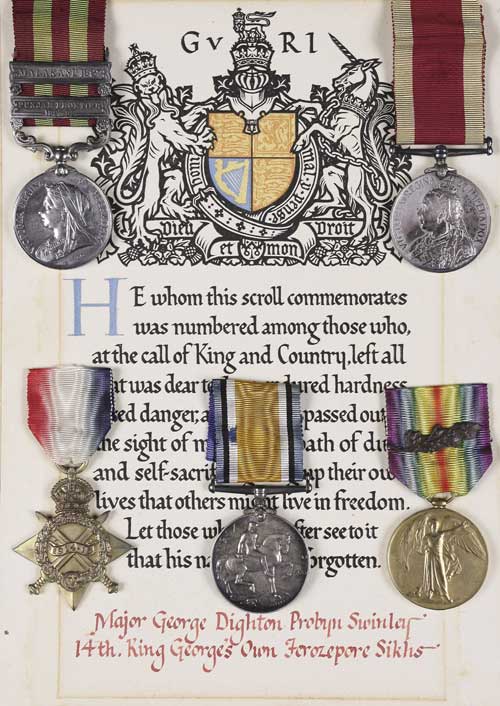
Auction: 7012 - Orders, Decorations, Medals & Militaria
Lot: 731
A Superb Group of Five to Major G.D.P. Swinley, 14th King George´s Own Ferozepore Sikhs, Wounded at the Defence of Malakand, 1897, and Was Mortally Wounded by a Sniper at Gallipoli, 1915 India General Service 1895-1902, V.R., two clasps, Punjab Frontier 1897-98, Malakand 1897 (Lieut. G.D.P. Swinley. 37th Dogras.); China 1900, no clasps (Lieut: G.D.P. Swinley. 14th Sikh Infy.); 1914-15 Star (Major G.D.P. Swinley. 14-Sikhs.), gilded; British War and Victory Medals, M.I.D. Oakleaves (Major G.D.P. Swinley.), very fine or better, with Great War Parchment Memorial Scroll (5) Estimate £ 2,000-2,500 M.I.D. London Gazette 17.3.1917 Maj. G.D.V. (sic) Swinley, 14th Sikhs. Major George Dighton Probyn Swinley, born Bunoo, India, 1874; son of Major-General G. Swinley, C.B., and grandson of Major-General G.H. Swinley; educated at Clifton College, Bristol, and R.M.A. Sandhurst; commissioned Second Lieutenant the Buffs, 1895; subsequently transferred to the Indian Staff Corps and as Officiating Wing Officer 37th Dogras, 9.3.1896 and was briefly attached as Lieutenant to the 31st Punjab Regiment for the Defence of Malakand, where he was severely wounded, 28.7.1897, ´during the attack on Malakand he was wounded by a bullet in the left upper arm..... he also received a severe blow from a stone thrown by a sling, just below the elbow joint..... his disability was reported to be nearly the equivalent to the loss of a limb´ (Medical Board Proceedings refers); Adjutant for the 37th Dogras 14.1.1900-30.6.1900; transferred as a Double-Company Officer, 14th Sikhs, 1.7.1900; Captain 16.1.1904; Major 14.1.1913; during the Great War he served with his regiment in the Egyptian Theatre of War from, October 1914, before embarking as part of the 29th Indian Brigade for Cape Helles; arrived at the latter, 30.4.1915, and landed on the 1st of May at ´V´ Beach; during the first night of their stay, the Sikhs encampment was bombed by an aeroplane; they served in support for the Second Battle of Krithia, 6-8th May, but did not engage; on the 12th May the 1/6th Gurkhas, by a dashing attack, gained possession of what became known as Gurkha Bluff - they had made a 600 yard advance, however their right had not been able to make the same ground and on the 13th an irregular frontage down to the Gully Ravine was apparent; during the morning of the 13th No. 1 (Commanded by Swinley) and 2 Double-Companies 14th Sikhs moved up to support the 6th Gurkhas and arrived at the head of Gully Ravine at 11am; at 4.30pm the 14th Sikhs relieved the 6th Gurkhas and the 89th Punjabis from the front line, ´the taking over of the right half of the Gurkha frontage by Numbers 1 and 2 Double-Companies along an irregular line that was only barely entrenched was a somewhat lengthy operation, in the course of which Major Swinley was mortally wounded [shot by a sniper] by a shot in the head.´ (14th K.G.O. Sikhs, F.E. Talbot, refers); the 14th Sikhs´ casualties for the day were 9 killed and 24 wounded; Swinley died of his wounds the next day and is buried in Pink Farm Cemetery, Helles. He was posthumously Mentioned in Despatches.
Sold for
£2,200




